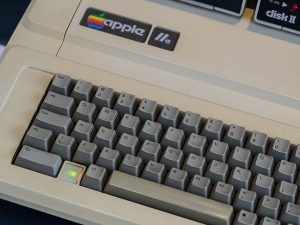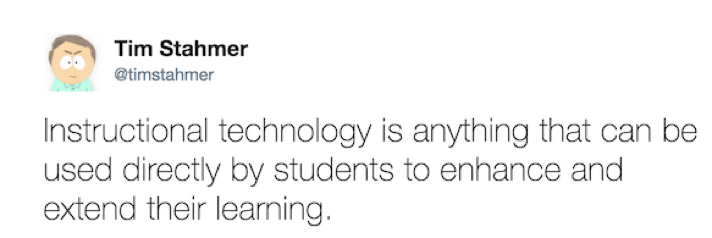
CC BY 2.0 (http://creativecommons.org/licenses/by/2.0)], via Wikimedia Commons
Here we are at the end of another school year. For me, it marks the end of my 37th year in education, and I still feel the excitement of the end (and of a beginning) of a school year. My first seventeen years, I was an elementary and middle school teacher. The last twenty years I have been working with instructional technology needs from our school board office. So, I have seen a lot of changes in technology use in our schools through the years.
I remember my first use of computers in my classroom. Back in the early 1980’s I found an Apple IIE computer sitting in the back of a library storage room. I was told it had been in there a couple of weeks and the librarian was not sure what it was for. I asked if I could roll it into my classroom and my journey of technology integration began! I found a PrintShop application on a 5 ¼ inch disk that I used along with an ImageWriter II color printer to make a banner to hang outside my classroom. Fellow colleagues saw the banner and they thought I was a computer genius!
A year later, I transferred to a middle school and guess what I found in their library storage room! Yep, but instead of one, I found three Apple IIE computers. No one was using them so I rolled them down to my room to use with my math classes. I had some students that were struggling with multiplications facts. I had tried several strategies to motivate them, but we were not successful. I found a piece of software where students would use a fire breathing dragon to answer multiplication questions by “breathing fire” on the correct math answers. Students learned their multiplication facts and I saw my first glimpse of how technology can make a difference with student learning!
Fast forward to today and the technology tools our students have access to have a come a long way from our Apple IIes and fire breathing dragons. We now access the cloud with devices that are becoming more powerful and some cases, less expensive everyday. We have augmented reality, virtual reality and the reality that everyone needs to be connected! Technology can be seen everywhere in our world and within our schools. Just because technology is there does not mean our students are better off now than they were thirty years ago when a few Apple computers were finding their ways into schools.
The technology can make a difference in our students’ learning, but it is not enough. The teacher is still the difference maker. The instructional design provided by the teacher determines how the students will be using the technology. Will instruction be student-centered? Will students be able to collaborate, problem-solve, think critically, be creative and demonstrate the potential technology provides them? When one looks in the classroom, is engaged learning taking place or is it just students sitting in front of devices? Technology can make a difference, but the teacher is the difference! All of you that are blessed to work with students in our classrooms, take the time to learn ways to integrate technology so it can really make a difference in our students’ learning.
I have seen the positive impact technology can have when the teacher facilitates instruction that taps into the potential of the students and the technology. We have access to so many great resources and tools to help our students learn. What a great time to be an educator! I hope everyone has a great summer! Thanks for all you do and I am off to go explore the Oregon Trail on an Apple IIe!
Tim Taylor is a member of the VSTE Board of Directors and Instructional Technology Supervisor for Shenandoah County Public Schools.








